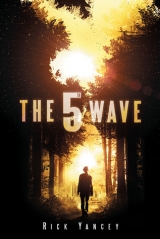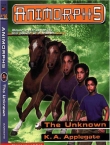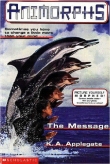
Текст книги "The 5th Wave"
Автор книги: Rick Yancey
Жанры:
Подростковая литература
,сообщить о нарушении
Текущая страница: 6 (всего у книги 27 страниц)


THE NEXT DAY, the drone came back.
Or a different drone, identical to the first. The Others probably hadn’t traveled all the way from another planet with just one in the hold.
It moved slowly across the sky. Silent. No growl of an engine. No hum. Just gliding soundlessly, like a fishing lure drawn through still water. We hustled into the barracks. No one had to tell us. I found myself sitting on a cot next to Crisco.
“I know what they’re going to do,” he whispered.
“Don’t talk,” I whispered back.
He nodded, and said, “Sonic bombs. You know what happens when you’re blasted with two hundred decibels? Your eardrums shatter. Your lungs bust open and air gets into your bloodstream, and then your heart collapses.”
“Where do you come up with this crap, Crisco?”
Dad and Hutchfield were crouched by the open door again. They watched the same spot for several minutes. Apparently, the drone had frozen in the sky.
“Here, I got you something,” Crisco said. It was a diamond pendant necklace. Body booty from the ash pit.
“That’s disgusting,” I told him.
“Why? It’s not like I stole it or anything.” He pouted. “I know what it is. I’m not stupid. It’s not the necklace. It’s me. You’d take it in a heartbeat if you thought I was hot.”
I wondered if he was right. If Ben Parish had dug the necklace out of the pit, would I have taken the gift?
“Not that I think you are,” Crisco added.
Bummer. Crisco the grave robber didn’t think I was hot.
“Then why do you want to give it to me?”
“I was a douche that night in the woods. I don’t want you to hate me. Think I’m a creeper.”
A little late for that.
“I don’t want dead people’s jewelry,” I said.
“Neither do they,” he said, meaning dead people.
He wasn’t going to leave me alone. I scooted up to sit behind Dad. Over his shoulder, I saw a tiny gray dot, a silvery freckle on the unblemished skin of the sky.
“What’s happening?” I whispered.
Right when I said that, the dot disappeared. Moved so fast, it seemed to wink out.
“Reconnaissance flights,” Hutchfield breathed. “Has to be.”
“We had satellites that could read someone’s watch from orbit,” Dad said quietly. “If we could do that with our primitive technology, why would they need to leave their ship to spy on us?”
“You got a better theory?” Hutchfield didn’t like his decisions being questioned.
“They may have nothing to do with us,” Dad pointed out. “These things might be atmospheric probes or devices used to measure something they can’t calibrate from space. Or they’re looking for something that can’t be detected until we’re mostly neutralized.”
Then Dad sighed. I knew that sigh. It meant he believed something was true that he didn’t want to be true.
“It comes down to a simple question, Hutchfield: Why are they here? Not to rape the planet for our resources—there’s plenty of those spread evenly throughout the universe, so you don’t have to travel hundreds of light-years to get them. Not to kill us, though killing us—or most of us—is necessary. They’re like a landlord who kicks out a deadbeat renter so he can get the house cleaned up for the new tenant; I think this has always been about getting the place ready.”
“Ready? Ready for what?”
Dad smiled humorlessly.
“Moving day.”


AN HOUR BEFORE DAWN. Our last day at Camp Ashpit. A Sunday.
Sammy beside me. Little kid snuggly warm, hand on his bear, other hand on my chest, curled-up pudgy baby-fist.
The best part of the day.
Those few seconds when you’re awake but empty. You forget where you are. What you are now, what you were before. It’s all breath and heartbeat and blood moving. Like being in your mother’s womb again. The peace of the void.
That’s what I thought the sound was at first. My own heartbeat.
Thumpa-thumpa-thumpa. Faint, then louder, then really loud, loud enough to feel the beat on your skin. A glow sprang up in the room, grew brighter. People were stumbling around, yanking on clothes, fumbling for guns. The bright glow faded, came back. Shadows jumped across the floor, raced up the ceiling. Hutchfield was yelling at everyone to stay calm. It wasn’t working. Everyone recognized the sound. And everyone knew what that sound meant.
Rescue!
Hutchfield tried to block off the doorway with his body.
“Stay inside!” he hollered. “We don’t want to—”
He was shoved out of the way. Oh yes, we do. We poured out the doorway and stood in the yard and waved at the helicopter, a Black Hawk, as it made another sweep of the compound, black against the lightening dark of the predawn sky. The spotlight stabbed down, blinding us, but most of us were already blinded by tears. We jumped, we shouted, we hugged one another. A couple of people were waving little American flags, and I remember wondering where the hell they got those.
Hutchfield was furiously screaming at us to get back inside. Nobody listened. He wasn’t the boss of us anymore. The People in Charge had arrived.
And then, just as unexpectedly as it had come, the helicopter made one last turn and thundered out of sight. The sound of its rotors faded. A heavy silence flooded in after it. We were confused, stunned, frightened. They must have seen us. Why didn’t they land?
We waited for the helicopter to come back. All morning we waited. People packed up their things. Speculated about where they would take us, what it would be like, how many others would be there. A Black Hawk helicopter! What else had survived the 1st Wave? We dreamed of electric lights and hot showers.
No one doubted we’d be rescued now that the People in Charge knew about us. Help was on its way.
Dad, being Dad, of course, wasn’t so sure.
“They may not come back,” he said.
“They wouldn’t just leave us here, Dad,” I said. Sometimes you had to talk to him like he was Sammy’s age. “How does that make sense?”
“It may not have been a search and rescue. They might have been looking for something else.”
“The drone?”
The one that had crashed a week earlier. He nodded.
“Still, they know we’re here now,” I said. “They’ll do something.”
He nodded again. Absently, like he was thinking about something else.
“They will,” he said. He looked hard at me. Do you still have the gun?”
I patted my back pocket. He threw his arm around me and led me to the storehouse. He pulled aside an old tarp lying in a corner. Underneath it was an M16 semiautomatic assault rifle. The same rifle that would become my bestie after everyone else was gone.
He picked it up and turned it in his hands, inspecting the rifle with that same absentminded professor look in his eyes.
“What do you think?” he whispered.
“About that? It’s totally badass.”
He didn’t jump on me for the language. Instead, he gave a little laugh.
He showed me how it worked. How to hold it. How to aim. How to switch out a clip.
“Here, you try.”
He held it toward me.
I think he was pleasantly surprised by what a quick study I was. And my coordination was pretty good, thanks to the karate lessons. Dance classes have nothing on karate when it comes to developing grace.
“Keep it,” he said when I tried to hand it back. “I hid it in here for you.”
“Why?” I asked. Not that I minded having it, but he was freaking me out a little. While everyone else was celebrating, my father was giving me training in firearms.
“Do you know how to tell who the enemy is in wartime, Cassie?” His eyes darted around the shack. Why couldn’t he look at me? “The guy who’s shooting at you—that’s how you tell. Don’t forget that.” He nodded toward the gun. “Don’t walk around with it. Keep it close, but keep it hidden. Not in here and not in the barracks. Okay?”
Shoulder pat. Shoulder pat not quite enough. Big hug.
“From now on, never let Sam out of your sight. Understand, Cassie? Never. Now go find him. I’ve got to see Hutchfield. And Cassie? If someone tries to take that rifle from you, you tell them to bring it up with me. And if they still try to take it, shoot them.”
He smiled. Not with his eyes, though. His eyes were as hard and blank and cold as a shark’s.
He was lucky, my dad. All of us were. Luck had carried us through the first three waves. But even the best gambler will tell you that luck only lasts so long. I think my dad had a feeling that day. Not that our luck had run out. No one could know that. But I think he knew in the end it wouldn’t be the lucky ones left standing.
It would be the hardcore. The ones who tell Lady Luck to go screw herself. The ones with hearts of stone. The ones who could let a hundred die so one might live. The ones who see the wisdom in torching a village in order to save it.
The world was FUBAR now.
And if you’re not okay with that, you’re just a corpse waiting to happen.
I took the M16 and hid it behind a tree bordering the path to the ash pit.


THE LAST REMNANT of the world I knew ripped apart on a sunny, warm Sunday afternoon.
Heralded by the growl of diesel engines, the rumble and squeak of axles, the whine of air brakes. Our sentries spotted the convoy long before it reached the compound. Saw the bright sunlight glinting off windows and the plumes of dust trailing the huge tires like contrails. We didn’t rush out to greet them with flowers and kisses. We stayed back while Hutchfield, Dad, and our four best shooters went out to meet them. Everyone was feeling a little spooked. And a lot less enthusiastic than we’d been just a few hours before.
Everything we’d expected to happen since the Arrival didn’t. Everything we hadn’t did. It took two whole weeks into the 3rd Wave for us to realize that the deadly flu was part of their plan. Still, you tend to believe what you always believed, think what you always thought, expect what you always expected, so it was never “Will we be rescued?” It was “When will we be rescued?”
And when we saw exactly what we wanted to see, what we expected to see—the big flatbed loaded with soldiers, the Humvees bristling with machine gun turrets and surface-to-air launchers—we still held back.
Then the school buses pulled into view.
Three of them, bumper to bumper.
Packed with kids.
Nobody expected that. Like I said, it was so weirdly normal, so shockingly surreal. Some of us actually laughed. A yellow freaking school bus! Where the hell is the school?
After a few tense minutes, where all we could hear was the throaty snarl of engines and the faint laughter and calls of the children on the buses, Dad left Hutchfield talking to the commander and came over to me and Sammy. A knot of people gathered around us to listen in.
“They’re from Wright-Patterson,” Dad said. He sounded out of breath. “And apparently a lot more of our military has survived than we thought.”
“Why are they wearing gas masks?” I asked.
“It’s precautionary,” he answered. “They’ve been in lockdown since the plague hit. We’ve all been exposed; we could be carriers.”
He looked down at Sammy, who was pressed up against me, his arms wrapped around my leg.
“They’ve come for the children,” Dad said.
“Why?” I asked.
“What about us?” Mother Teresa demanded. “Aren’t they going to take us, too?”
“He says they’re coming back for us. Right now there’s only room for the children.”
Looking at Sammy.
“They’re not splitting us up,” I said to Dad.
“Of course not.” He turned away and abruptly marched into the barracks. Came out again, carrying my backpack and Sammy’s bear. “You’re going with him.”
He didn’t get it.
“I’m not going without you,” I said. What was it about guys like my father? Somebody in charge shows up and they check their brains at the door.
“You heard what he said!” Mother Teresa cried shrilly, shaking her beads. “Just the children! If anyone else goes, it should be me…women. That’s how it’s done. Women and children first! Women and children.”
Dad ignored her. There went the hand on my shoulder. I shrugged his hand away.
“Cassie, they have to get the most vulnerable to safety first. I’ll be just a few hours behind you—”
“No!” I shouted. “We all stay or we all go, Dad. Tell them we’ll be fine here until they get back. I can take care of him. I’ve been taking care of him.”
“And you will take care of him, Cassie, because you’re going, too.”
“Not without you. I won’t leave you here, Dad.”
He smiled like I had said something kiddy-cute.
“I can take care of myself.”
I couldn’t put it into words, this feeling like a hot coal in my gut, that splitting up what was left of our family would be the end of our family. That if I left him behind I would never see him again. Maybe it wasn’t rational, but the world I lived in wasn’t rational anymore.
Dad pried Sammy from my leg, slung him onto his hip, grabbed my elbow with his free hand, and marched us toward the buses. You couldn’t see the soldiers’ faces through the buggy-looking gas masks. But you could read the names stitched onto their green camouflage.
GREENE.
WALTERS.
PARKER.
Good, solid, all-American names. And the American flags on their sleeves.
And the way they held themselves, erect but loose, alert but relaxed. Coiled springs.
The way you expect soldiers to look.
We reached the last bus in the line. The children inside shouted and waved at us. It was all one big adventure.
The burly soldier at the door raised his hand. His name patch said BRANCH.
“Children only,” he said, his voice muffled by the mask.
“I understand, Corporal,” Dad said.
“Cassie, why are you crying?” Sammy said. His little hand reached for my face.
Daddy lowered him to the ground. Knelt to bring his face close to Sammy’s.
“You’re going on a trip, Sam,” Dad said. “These nice army men are taking you to a place where you’ll be safe.”
“Aren’t you coming, Daddy?” Tugging on Dad’s shirt with his tiny hands.
“Yes. Yes, Daddy’s coming, just not yet. Soon, though. Very soon.”
He pulled Sammy into his arms. Last hug. “You be good now. You do what the nice army men tell you. Okay?”
Sammy nodded. Slipped his hand into mine.
“Come’n, Cassie. We’re going to ride a bus!”
The black mask whipped around. A gloved hand went up.
“Just the boy.”
I started to tell him to stuff it. I wasn’t happy about leaving Dad behind, but Sammy wasn’t going anywhere without me.
The corporal cut me off. “Only the boy.”
“She’s his sister,” Dad tried. He was being reasonable. “And she’s a child, too. She’s only sixteen.”
“She’ll have to stay here,” the corporal said.
“Then he’s not getting on,” I said, wrapping both arms around Sammy’s chest. He’d have to pull my damn arms off to take my little brother.
There was this awful moment when the corporal didn’t say anything. I had the urge to rip the mask off his head and spit in his face. The sun glinted off the visor, a hateful ball of light.
“You want him to stay?”
“I want him to stay with me,” I corrected him. “On the bus. Off the bus. Whatever. With me.”
“No, Cassie,” Dad said.
Sammy started to cry. He got it: It was Daddy and the soldier against me and him, and there was no winning that battle. He got it before I did.
“He can stay,” the soldier said. “But we can’t guarantee his safety.”
“Oh, really?” I shouted into his bug-face. “You think? Whose safety can you guarantee?”
“Cassie…,” Dad started.
“You can’t guarantee shit,” I yelled.
The corporal ignored me. “It’s your call, sir,” he said to Dad.
“Dad,” I said. “You heard him. He can stay with us.”
Dad chewed on his bottom lip. He lifted his head and scratched under his chin, and his eyes regarded the empty sky. He was thinking about the drones, about what he knew and what he didn’t know. He was remembering what he’d learned. He was weighing odds and calculating probabilities and ignoring the little voice piping up from the deepest part of him: Don’t let him go.
So of course he did the most reasonable thing. He was a responsible adult, and that’s what responsible adults do.
The reasonable thing.
“You’re right, Cassie,” he said finally. “They can’t guarantee our safety—no one can. But some places are safer than others.” He grabbed Sammy’s hand. “Come on, sport.”
“No!” Sammy screamed, tears streaming down bright red cheeks. “Not without Cassie!”
“Cassie’s going,” Dad said. “We’re both going. We’ll be right behind you.”
“I’ll protect him, I’ll watch him, I won’t let anything happen to him,” I pleaded. “They’re coming back for the rest of us, right? We’ll just wait for them to come back.” I pulled on his shirt and put on my best pleading face. The one that usually got me what I wanted. “Please, Daddy, don’t do this. It isn’t right. We have to stay together, we have to.”
It wasn’t going to work. He had that hard look in his eyes again: cold, clamped down, remorseless.
“Cassie,” he said. “Tell your brother it’s okay.”
And I did. After I told myself it was okay. I told myself to trust Dad, trust the People in Charge, trust the Others not to incinerate the school buses full of children, trust that trust itself hadn’t gone the way of computers and microwavable popcorn and the Hollywood movie where the slimeballs from Planet Xercon are defeated in the final ten minutes.
I knelt on the dusty ground in front of my little brother.
“You need to go, Sams,” I said. His fat lower lip bobbed up and down. Clutching the bear to his chest.
“But, Cassie, who’s going to hold you when you’re scared?” He was being totally serious. He looked so much like Dad with that concerned little frown that I almost laughed.
“I’m not scared anymore. And you shouldn’t be scared, either. The soldiers are here now, and they’re going to make us safe.”
I looked up at Corporal Branch. “Isn’t that right?”
“That’s right.”
“He looks like Darth Vader,” Sammy whispered. “Sounds like him, too.”
“Right, and remember what happens? He turns into a good guy at the end.”
“Only after he blows up a whole planet and kills a lot of people.”
I couldn’t help it—I laughed. God, he was smart. Sometimes I thought he was smarter than me and Dad combined.
“You’re going to come later, Cassie?”
“You bet I am.”
“Promise?”
I promised. Whatever happened. No. Matter. What.
That was all he needed to hear. He pushed the teddy bear into my chest.
“Sam?”
“For when you’re scared. But don’t leave him.” He held up a tiny finger to emphasize his point. “Don’t forget.”
He stuck out his hand to the corporal. “Lead on, Vader!” Gloved hand engulfed pudgy hand. The first step was almost too high for his little legs. The kids inside squealed and clapped when he turned the corner and hit the center aisle.
Sammy was the last to board. The door closed. Dad tried to put his arm around me. I stepped away. The engine revved. The air brakes hissed.
And there was his face against the smudged glass and his smile as he rocketed across a galaxy far, far away in his yellow X-wing starfighter, jumping to warp speed, until the dusty yellow spaceship was swallowed by dust.


“THIS WAY, SIR,” the corporal said politely, and we followed him back to the compound. Two Humvees had left to escort the buses back to Wright-Patterson. The remaining Humvees sat facing the barracks and the storage shed, the barrels of their mounted machine guns pointing at the ground, like the dipped heads of some metallic creatures dozing.
The compound was empty. Everybody—including the soldiers—had gone inside the barracks.
Everybody except one.
As we walked up, Hutchfield came out of the storage shed. I don’t know what was beaming brighter, his shaved head or his smile.
“Outstanding, Sullivan!” he boomed at Dad. “And you wanted to bug out after that first drone.”
“Looks like I was wrong,” Dad said with a tight smile.
“Briefing by Colonel Vosch in five minutes. But first I need your ordnance.”
“My what?”
“Your weapon. Colonel’s orders.”
Dad glanced at the soldier standing beside us. The blank, black eyes of the mask stared back at him.
“Why?” Dad asked.
“You need an explanation?” Hutchfield’s smile stayed put, but his eyes narrowed.
“I would like one, yes.”
“It’s SOP, Sullivan, standard operating procedure. You can’t have a bunch of untrained, inexperienced civilians packing heat in wartime.” Talking down to him, like he was a moron.
He held out his hand. Dad pulled the rifle slowly from his shoulder. Hutchfield snatched the rifle from Dad and disappeared into the storehouse.
Dad turned to the corporal. “Has anyone made contact with the…” He searched for the right word. “The Others?”
One word, spoken in a raspy monotone: “No.”
Hutchfield came out and smartly saluted the corporal. He was neck-deep in his element now, back with his brothers in arms. He was bursting all over with excitement, like any second he would pee himself.
“All weapons accounted for and secured, Corporal.”
All except two, I thought. I looked at Dad. He didn’t move a muscle, except the ones around his eyes. Flick to the right, flick to the left. No.
There was only one reason I could think of that he’d do that. And when I think about it, if I think too much about it, I start to hate my father. Hate him for distrusting his own instincts. Hate him for ignoring the little voice that must have been whispering, This is wrong. Something about this is wrong.
I hate him right now. If he were here right now, I’d punch him in the face for being such an ignorant dweeb.
The corporal motioned toward the barracks. It was time for Colonel Vosch’s briefing.
Time for the world to end.








